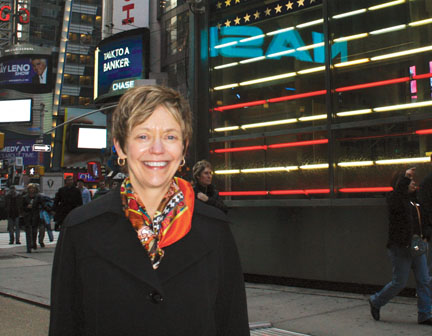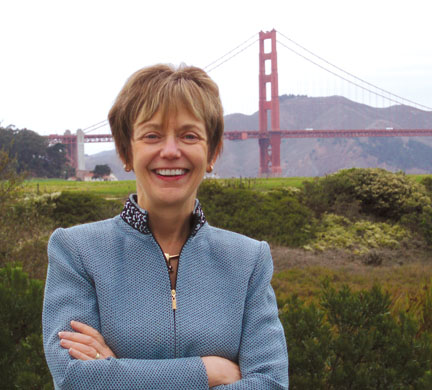Listening to Lead: Lessons from the Road
Swarthmore alumni are teaching me a great deal about the College on a Listening Tour that has already taken me to Washington, D.C.; San Francisco; Palo Alto; Chicago; New York City; Philadelphia; and Boston, with more stops planned this year. Some tell me about their experiences in athletics, in the arts, in clubs, and with friends, and always, about how passionately they engaged in learning with the faculty. I have heard about the courtships of matchbox couples, the excitement of political marches in Washington, and the complexities and tragedy of the 1969 sit-in. I feel privileged to hear what’s important to Swarthmoreans, what concerns members of our extended community, and what hopes and aspirations they have for the College.
I have undertaken this Listening Tour because I want to know how to live the values of Swarthmore and how to steward its special traditions even as the College continues to evolve. Leadership at Swarthmore is, in some real way, an act of mutual trust within the community. My role may be as the co-author of Swarthmore’s narrative, but it is a role I will play only through conversation and planning with you. Not everyone can be at the table with the Board of Managers, the faculty, or our students at any given time, but the participants who are at the table should listen, ask questions, and deliberate in ways that include each of you who support our school in so many ways.
What are alumni telling me during this tour? Since Swarthmore alumni love to engage in what someone fondly called the “endless conversation,” I have heard many ideas, experiences, concerns, and desires for our College. Let me share a few key themes.
Academic rigor, the joy of learning, and the confidence to think critically
The dominant experience alumni share is how challenging their education was and how it gave them confidence to think critically. Many mention a particular faculty member who opened for them a new way of thinking. Some speak movingly about not having been particularly great students until a faculty member coached and inspired them to think and express themselves more effectively.
Others say that the Honors Program and faculty-student research provided settings in which critical thinking skills were sharpened.
Off-campus study and Swarthmore’s growing commitment to global citizenship have also shaped and expanded the world view of many alumni. Although the faculty’s commitment to help students become agents of their own learning is one of the most important assets we have, alumni also say that they learned from each other through long debates in the dining and residence halls, by working together on science projects, by preparing theater productions, or just by listening to each other’s perspectives.
The confidence they gained at the College allows our alumni to travel widely, to master new topics, to learn new languages, and to lead deeply thoughtful lives as well as satisfying professional lives. I delight in the fact that many describe this life skill as a great joy. And I also appreciate that more than a few remind us to be humble about our skills and knowledge and how we use them. We should also make sure that the College’s intellectual environment is equally inviting for those who wish to enter business, the academy, or the nonprofit sector. Numerous alumni have also stressed the importance of continuing to strengthen our career services program.
Community—values, friendship, diversity
The experience and significance of achieving community at the College run nearly neck-and-neck with academics as critical to our alumni. Our community—large enough for authentic diversity yet small enough for real engagement—serves as a powerful Petri dish for learning respect for others, understanding how to engage diversity, developing deep bonds of friendship, and appreciating its own special values.
Swarthmore’s Quaker history is frequently affirmed as the source of those special values, and many hope we can make them more explicit. Some note the importance of respect for nature and urge me to do more in the area of sustainability. Many stress the importance of keeping the school small enough to combine intimacy and diversity in a meaningful way—though the definition of “small” can be the subject of keen debate.
Common good, justice, and speaking truth to power
Swarthmoreans contribute to the common good of the world, the country, and their communities in multiple and diverse ways. Many talk about their responsibility to link their education and talents to service to others. For many, a focus on social justice and speaking truth to power is a natural continuation of our Hicksite Quaker tradition.
Many alumni hope that we can find a way to take a leadership role in this country around three key issues: education, civil discourse and the common good, and sustainability. Others, however, worry that so much emphasis on “saving the world” may sometimes get in the way of the core mission to help students learn to think critically.
Athletics and the arts
Athletics has a longer history than “organized” arts do at Swarthmore, but both provide important experiences for the community and educational experiences for the participants and become sources of fond memories for alumni. Athletes talk about learning the lessons of discipline, teamwork, and time management from their sports, club, or intramural experiences, and many alumni hope we can find a way to signal that we value the contributions of athletics.
The arts, although initially not embraced by our Quaker founders, have more recently been present at Swarthmore in theater, music, the visual arts, and since the 1960s, in academic departments and programs. The importance of the arts on campus is now unquestioned. Our alumni rightly ask, aren’t both arts and athletics—broadly expressed—significant contributors to the well-lived life?
Need-blind admissions, budgeting, and philanthropy
Many stress the importance of our need-blind admissions policy. Generous financial aid has provided access for many, resulting in a more diverse community. All seem in favor of ensuring that our loan-free policy endures for low-income students, but some wonder whether we should revisit our loan-free policy for all students regardless of family income. This perspective is related to numerous questions about how our budget and endowment are faring, even as we begin to inch out of the Great Recession. Financial aid, more than any single part of our budget, presents a high impact area in philanthropy, and alumni are urging us to move cautiously as we contemplate any changes to our policies in the context of our budget adjustments. Many take pride in our alumni-giving rate (more than 55 percent last year) and hope it can be taken higher still.
I hope that you will attend a Listening Tour event near your home, visit the Web site and share your thoughts on the blog, or contact me in some other fashion. Even as we continue the Listening Tour during the spring semester, I promise you bold and determined leadership—another message I have been hearing on the road. We will soon begin to develop a strategic plan to guide us as we move with confidence into the future. But before we plan, we must discuss and debate our perspectives, our concerns, our dreams, and our commitments, and only then can our shared vision for the College’s future deepen the roots required to grow and to ensure that we flourish in the years ahead.
 Email This Page
Email This Page


